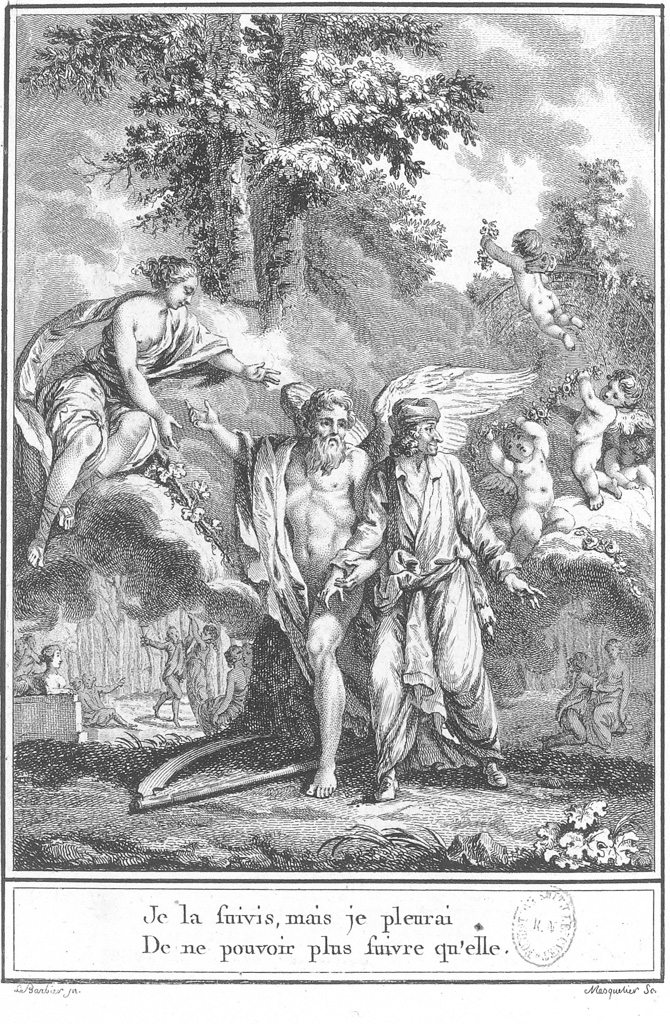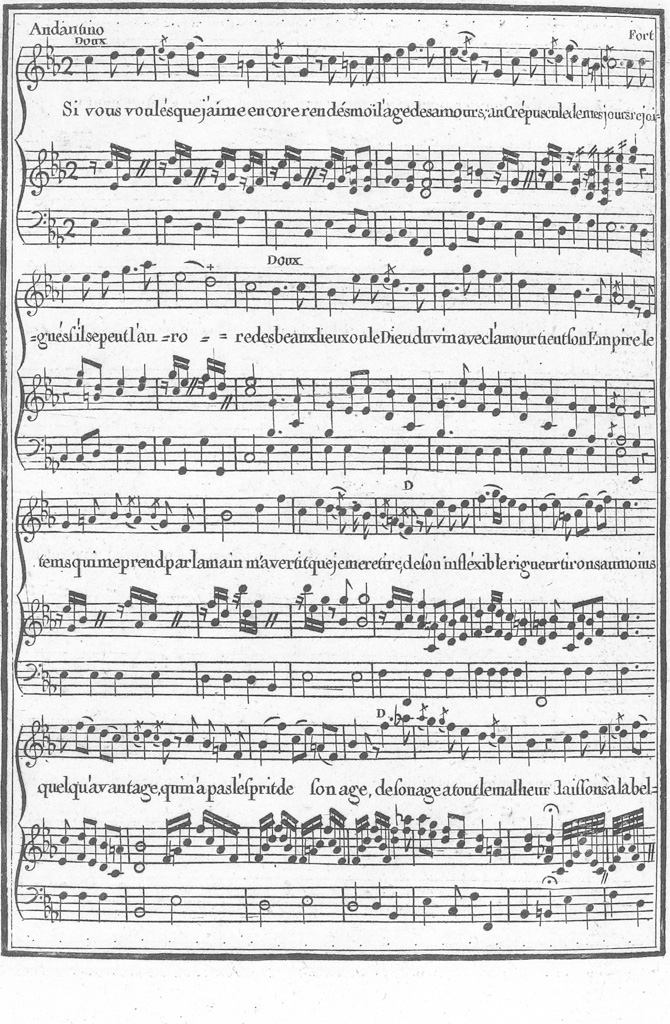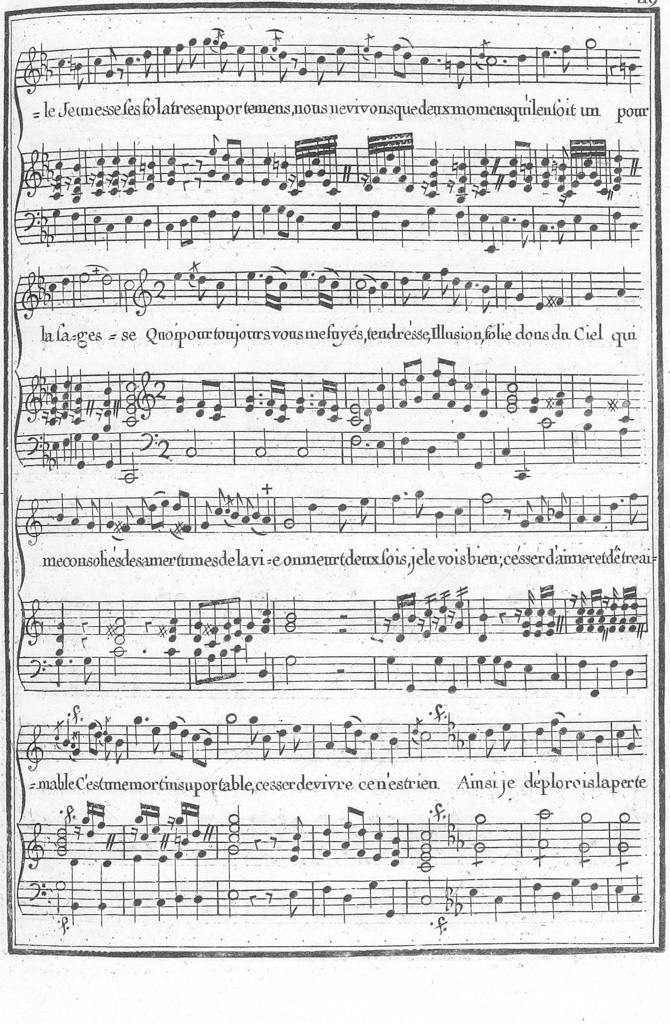


Look:
View Image(s): Chantilly, 1773, Compare
Image Metadata:
Image Description:
Plate Signature: “LeBarbier in. / Masquelier Sc”
Artist: “Lebarbier, Jean Jacques François”
Engraver: “Masquelier, Louis Joseph, I”
Year:
Inscription: “Je la suivis, mais je pleurai / De ne pouvoir plus suivre qu’elle.”
Keywords: Amitié arches caps (headgear) couples dancing (activity) day (time of day) drinking drunkenness exterior Father Time (allegorical character) female breast festoon (motif) fog forests (plant communities) gardens (open spaces) grasses (plants) lovers Malva sylvestris putti (children) Rosa (genus) sandals sculpture (visual works) scythes sphinxes trees trellises Voltaire wine cups wings (animal components)
Texts which refer to this image:
Other works of art quoted in this image:
General Metadata:
Group Page Range: Vol. 4, 116-120
Title Page Inscription: “LE DERNIER / PARTI / A PRENDRE”
Published Notes:
Listen:
View Score(s): 1773
Song 1 recording: Si vous voulés que j’aime encor
Credit: Paul McMahon, tenor
Amy Moore, soprano
Erin Helyard, harpsichord (French double by Carey Beebe after Blanchet, 1991)
Temperament: Jean-Henri Lambert, 1774, A:392
Song 1 diction recording:
Credit: Eighteenth-century diction prepared and declaimed by Linda Barcan with the assistance of Erin Helyard and Veronique Duche
Music Metadata:
Song 1 Description:
Arguably the finest and most meticulously constructed of all the chansons, Laborde seems to have responded rather sensitively to his friend Voltaire’s text on this occasion. Several elements point towards the care that Laborde took over this setting. First, the text is set as a bourrée en rondeau which allows Laborde to mirror the contrasting sentiments of Voltaire’s text, all the while building an heartfelt effect that is intensified on each repeat of the rondeau. Second, there are more dynamic markings than are usual in the Choix de Chansons which seems to indicate that Laborde was seeking a highly expressive performance. And third, rather than having the accompaniment repeat the same material for each rondeau repetition, Laborde has slightly varied the accompaniments, which indicates again the nuanced delivery he was seeking in this chanson. Unfortunately, this care is not matched in the engraving of the notation, which is extremely cramped and poorly planned. In this instance the overcrowded words and notes mean that any performance from this manuscript is challenging indeed. The choice of C minor in relation to Voltaire’s poetry recalls the later writer’s Schubart’s thoughts on the tonality: C minor is a “declaration of love and at the same time the lament of unhappy love. All languishing, longing, sighing of the love-sick soul lies in this key” (1803). One of the contrasting sections in the relative major appears to quote Gluck’s “J’ai perdu mon Eurydice,” which Laborde may have heard in the French version of Orphée et Eurydice which had premiered in Paris on 2 August 1774.
Song 1 Composer: [Laborde, Jean-Benjamin de]
Song 1 Key Signature: c/C
Song 1 Time Signature: 2
Song 1 Expression Marks: Andantino
Song 1 Tessitura of Voice: eb1-ab2
Song 1 Tessitura of Instrument: C-c3
Song 1 Strophic: Non-strophic
Song 1 Related Compositions:
Read:
Song 1 Transcription:
Si vous voulés que j’aime encore
rendés moi l’age des amours;
au Crépuscule de mes jours
rejoignés s’il se peut l’aurore
des beaux lieux ou le Dieu du vin
avec l’amour tient son Empire
le tems qui me prend par la main
m’avertit que je me retire,
de son infléxible rigueur
tirons au moins quelqu’avantage,
qui n’a pas l’esprit de son age,
de son age a tout le malheur
laissons à la belle Jeunesse
ses folatres emportemens,
nous ne vivons que deux momens
qu’il en soit un pour la sagesse
Quoi pour toujours vous me fuyés,
tendrésse, Illusion, folie
dons du Ciel qui me consoliés
des amertumes de la vie
on meurt deux fois, je le vois bien;
césser d’aimer et d’être aimable
C’est une mort insuportable,
cesser de vivre ce n’est rien
Ainsi je déplorois la perte
des erreurs de mes premiers ans,
et mon àme aux desirs ouverte
regrettoit ses égaremens:
Du Ciel alors daignant descendre
l’amitié vint à mon secours,
elle était peut être aussi tendre,
mais moins vive que les amours
Touché de sa beauté nouvelle
et de sa lumiere éclairé;
je la suivis; mais je pleurai
de ne pouvoir plus suivre qu’elle.
Text Metadata:
Song 1 Text Description:
Song 1 Incipit: Si vous voulés que j’aime encor
Song 1 Author: Voltaire
Song 1 Text Keywords:
Sources that refer to song 1 text:
Sources that song 1 text refers to:





